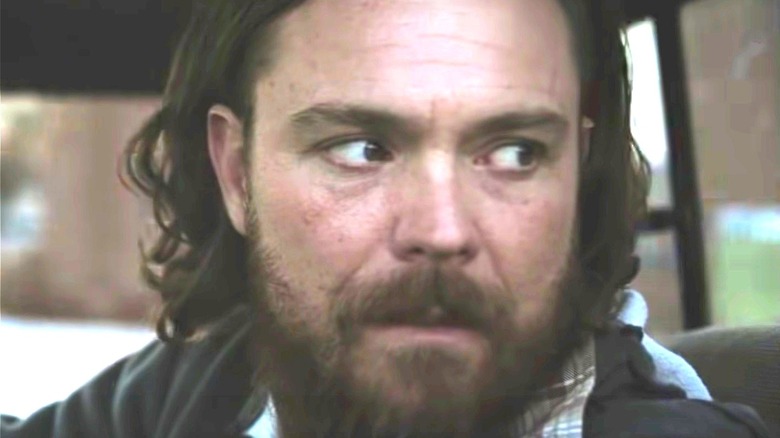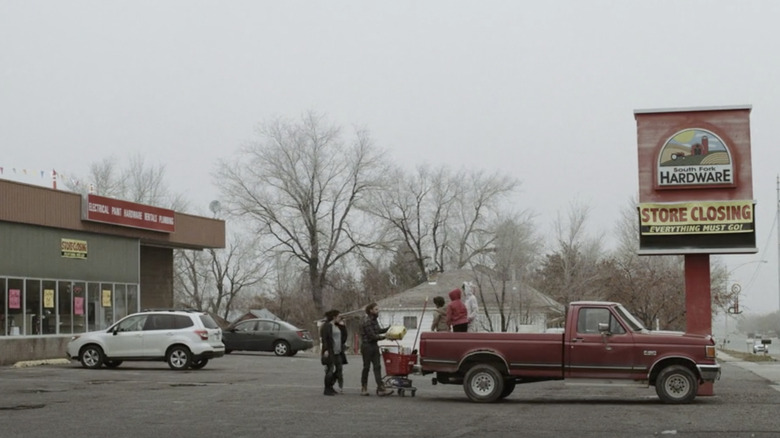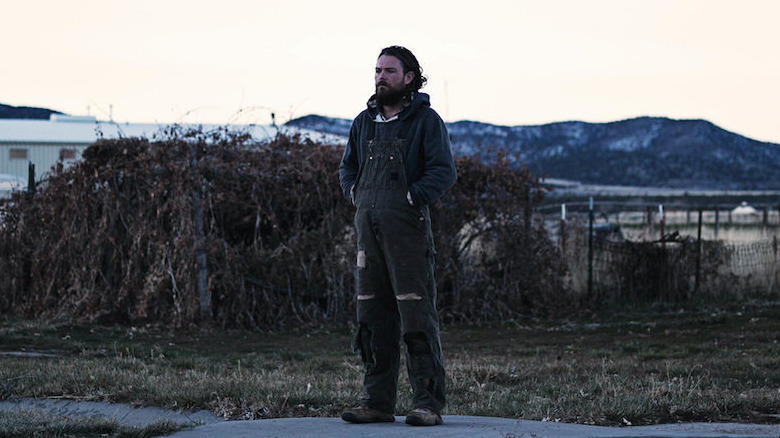The Ending Of The Killing Of Two Lovers Explained
Set in a quiet and desolated-feeling small town in Utah, filmmaker Robert Machoian creates an unsettling and tense underlying mood in his latest film, "The Killing of Two Lovers." The film stars Clayne Crawford ("A Walk to Remember," formerly on the "Lethal Weapon" series) as the rugged David, a struggling, hardworking father of four children. Sepideh Moafi ("The Deuce," "The L Word: Generation Q") plays the estranged wife, Niki, who develops feelings for another man named Derek, played by Chris Coy ("The Deuce"), with whom she becomes involved.
While navigating difficulties in their marriage, high school sweethearts David and Niki agree to see other people in the meantime while they are trying to figure out the messy terms of their trial separation. David moves out of their house and into his unwell father's home and deals with the emotionally taxing burden of taking care of him. David and Niki's daughter, Jess (Avery Pizzuto), is an angsty teenager whose only wish is for her dad to fight for her mom and keep their family from falling apart. David has an enormous amount of pressure on his shoulders, and that's evident through the eerie score and Crawford's brilliant portrayal of a man who may erupt at any moment.
The almost-shot heard round the world
"The Killing of Two Lovers" tensely opens on dismayed and exhausted David holding a gun. He is debating on whether or not to pull the trigger on Niki and the man sleeping next to her, who isn't revealed until slightly later in the film to be her new lover, Derek. David decides to not shoot them and the long tracking shot that follows shows him running back to his truck, suggesting panic since we don't see who could possibly be going after him. Even though David doesn't go through with the act, the tension refuses to subside. Machoian's filmmaking strengths really shine through in this aspect.
A rigid jumble of noises creeps into the background of nearly every frame, adding to the uneasiness of David's terse and complicated situation, while also highlighting the mundane routine of his everyday life. Although the pacing is quite slow, never for a moment does it not feel like something is building up. David's breaking point is near.
A non-coincidental encounter with Derek at the local convenience store shows his arrogance, as he asks David to pour him coffee and put some sugar in his cup because his hands were too "full." Perhaps he starts to suspect that David wants to kill him. He also proves to be an aggressive hothead who brutally beats David up after a marital argument he insisted on participating in. Derek is possessive of Niki and he clearly makes that known.
One relationship ended, the other survived
"The Killing of Two Lovers" presents an open-ended, if ostensibly hopeful finale. David and Niki are back together by the film's end, evident by a wide shot of them and their family loading a new dishwasher into David's truck. With Derek out of the picture, they are seemingly happy and back to normal. Although everything seems alright for now, there is still an apprehensive feeling of anxiety and uncertainty lurking around every corner. Nothing is ever truly resolved and nothing gets easier.
There are some questions to be posed, however. What happened to Derek? Could he get his revenge on the couple and end up killing them? Will David continue to be a deadbeat dad stuck in the same town forever, unable to truly make anything of his life? Can David and Niki make their marriage last? Machoian certainly leaves many possibilities for interpretation on the proverbial table.
A marriage film that isn't really about marriage
"The Killing of Two Lovers" is quite unlike any other indie relationship-centered film about a couple jumping over hurdles in their marriage. It's subtly poetic in the stark imagery (shot beautifully by cinematographer Oscar Ignacio Jiménez) and discomforting atmospheric tone, evoking the sensation that at any given instance, something tragic could happen. David and Niki's marriage seems fraught from the very beginning, although they clearly both still love each other.
Filmed in a 4:3 aspect ratio (via IndieWire), viewers get the claustrophobic sense of observing David's world under a microscopic lens. He is trapped, not only in the isolated town where everybody knows everyone and their business but also in Niki's current situation, one which he doesn't understand and is trying his best to work through. The film is more than anything about a man figuring out himself, his relationships with his wife and kids, and his place in a society that is changing with or without him.


